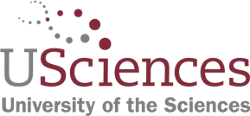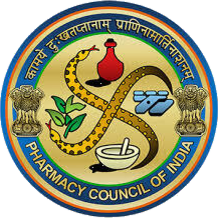
A pharmacist, also known as a chemist or a druggist, is a healthcare professional who specializes in the preparation, dispensing, and management of medications to ensure safe and effective use, while also providing medication counseling and guidance to patients and healthcare providers. Also, pharmacists often serve as primary care providers in the community, and may offer other services such as health screenings and immunizations.

University of the Sciences in Philadelphia, previously Philadelphia College of Pharmacy and Science (PCPS), was a private university in Philadelphia, Pennsylvania. On June 1, 2022, it officially merged into Saint Joseph's University.

Pharmacy is the science and practice of discovering, producing, preparing, dispensing, reviewing and monitoring medications, aiming to ensure the safe, effective, and affordable use of medicines. It is a miscellaneous science as it links health sciences with pharmaceutical sciences and natural sciences. The professional practice is becoming more clinically oriented as most of the drugs are now manufactured by pharmaceutical industries. Based on the setting, pharmacy practice is either classified as community or institutional pharmacy. Providing direct patient care in the community of institutional pharmacies is considered clinical pharmacy.

The UCL School of Pharmacy is the pharmacy school of University College London (UCL). The School forms part of UCL's Faculty of Life Sciences and is located in London, United Kingdom.
A Doctor of Pharmacy is a professional doctorate in pharmacy. In some countries, it is a doctoral degree to practice the profession of pharmacy or to become a clinical pharmacist. In many countries, people with their Doctor of Pharmacy are allowed to practice independently and can prescribe drugs directly to patients. A PharmD program has significant experiential and/or clinical education components in introductory and advanced levels for the safe and effective use of drugs. Experiential education prepares graduates to be practice-ready, as they already have spent a significant amount of time training in areas of direct patient care and research.
The Royal Pharmaceutical Society is the body responsible for the leadership and support of the pharmacy profession (pharmacists) within England, Scotland, and Wales. It was created along with the General Pharmaceutical Council (GPhC) in September 2010 when the previous Royal Pharmaceutical Society of Great Britain was split so that representative and regulatory functions of the pharmacy profession could be separated. Membership in the society is not a prerequisite for engaging in practice as a pharmacist within the United Kingdom. Its predecessor the Pharmaceutical Society of Great Britain was founded on 15 April 1841.
The International Pharmaceutical Federation or Fédération Internationale Pharmaceutique, abbreviated as FIP, is a nongovernmental organization (NGO) in official relations with the World Health Organization. It is the global body representing over four million pharmacists, pharmaceutical scientists and pharmaceutical educators through 153 national organisations, academic institutional members and individual members.
Pharmacotherapy is therapy using pharmaceutical drugs, as distinguished from therapy using surgery, radiation, movement, or other modes. Among physicians, sometimes the term medical therapy refers specifically to pharmacotherapy as opposed to surgical or other therapy; for example, in oncology, medical oncology is thus distinguished from surgical oncology. Pharmacists are experts in pharmacotherapy and are responsible for ensuring the safe, appropriate, and economical use of pharmaceutical drugs. The skills required to function as a pharmacist require knowledge, training and experience in biomedical, pharmaceutical and clinical sciences. Pharmacology is the science that aims to continually improve pharmacotherapy. The pharmaceutical industry and academia use basic science, applied science, and translational science to create new pharmaceutical drugs.
Academic detailing is "university or non-commercial-based educational outreach." The process involves face-to-face education of prescribers by trained health care professionals, typically pharmacists, physicians, or nurses. The goal of academic detailing is to improve prescribing of targeted drugs to be consistent with medical evidence from randomized controlled trials, which ultimately improves patient care and can reduce health care costs. A key component of non-commercial or university-based academic detailing programs is that they do not have any financial links to the pharmaceutical industry.
American Society of Health-System Pharmacists (ASHP) is a professional organization that represents pharmacists who serve as patient care providers in hospitals, health systems, ambulatory clinics, and other healthcare settings. The organization's nearly 58,000 members include pharmacists, student pharmacists, and pharmacy technicians. ASHP maintains a national database on U.S. drug shortages that is published on their website.

In the field of pharmacy, compounding is preparation of a custom medication to fit a unique need of a patient that cannot be met with commercially available products. This may be done for medical reasons, such as administration in a different format, to avoid a non-active ingredient the patient is allergic to, or to provide an exact dose that isn't commercially available. Patient-specific compounding according to a prescriber's specifications is referred to as "traditional" compounding. The nature of patient need for such customization can range from absolute necessity to individual optimality to even preference.

The American Pharmacists Association, founded in 1852, is the first-established professional society of pharmacists in the United States. The association consists of more than 62,000 practicing pharmacists, pharmaceutical scientists, student pharmacists, pharmacy technicians, and others interested in the profession. Nearly all U.S. pharmacy specialty organizations were originally a section or part of this association.
A veterinary pharmacist is a specially trained pharmacist who dispenses veterinary drugs and supplies or products and advice to owners of companion animals and livestock. In addition, they advise the regulatory bodies and are involved in the formulation of veterinary drugs. Veterinary pharmacy is a field of pharmacy practice, in which veterinary pharmacists may compound medications, fill prescriptions, and manage drug therapies for animals. Veterinary pharmacists are licensed pharmacists who specialize in the distribution of medications for animals.

Clinical pharmacy is the branch of pharmacy in which clinical pharmacists provide direct patient care that optimizes the use of medication and promotes health, wellness, and disease prevention. Clinical pharmacists care for patients in all health care settings but the clinical pharmacy movement initially began inside hospitals and clinics. Clinical pharmacists often work in collaboration with physicians, physician assistants, nurse practitioners, and other healthcare professionals. Clinical pharmacists can enter into a formal collaborative practice agreement with another healthcare provider, generally one or more physicians, that allows pharmacists to prescribe medications and order laboratory tests.
Pharmacy in China involves the activities engaged in the preparation, standardization and dispensing of drugs, and its scope includes the cultivation of plants that are used as drugs, the synthesis of chemical compounds of medicinal value, and the analysis of medicinal agents. Pharmacists in China are responsible for the preparation of the dosage forms of drugs, such as tablets, capsules, and sterile solutions for injection. They compound physicians', dentists', and veterinarians' prescriptions for drugs. Pharmacological activities are also closely related to pharmacy in China.

The University of Florida College of Pharmacy is the pharmacy school of the University of Florida. The College of Pharmacy was founded in 1923 and is located on the university's Gainesville, Florida main campus. The college offers the entry-level Doctor of Pharmacy (Pharm.D.) degree as the first professional degree for students entering the profession. The college offered a Working Professional Pharm.D. (WPPD) program for bachelor's-trained pharmacists already in practice with its last cohort of students enrolled in 2016. Additionally, various graduate degrees are offered. The professional program is fully accredited by the American Council on Pharmaceutical Education. Since 2011 the college has been offering online degree programs at the graduate level, such as the Forensic Science Program, Pharmaceutical Chemistry Program and Clinical Toxicology Program. In total the College of Pharmacy received over $32 million in total Research Revenues in 2021.

The Pharmacy Council of India (PCI) is the statutory body under Ministry of Health and Family Welfare, Government of India. It is constituted under the Pharmacy Act, 1948. The Council was first constituted on 4 March 1948. Dr. Montukumar Patel is elected as new president.
Drug recycling, also referred to as medication redispensing or medication re-use, is the idea that health care organizations or patients with unused drugs can transfer them in a safe and appropriate way to another patient in need. The purpose of such a program is reducing medication waste, thereby saving healthcare costs, enlarging medications’ availability and alleviating the environmental burden of medication.

A clinical pharmaceutical scientist is a licensed, practicing pharmacist who also functions as an independent researcher in the pharmaceutical sciences. Clinical pharmaceutical scientists are a type of clinician scientist, analogous to physician-scientists.










